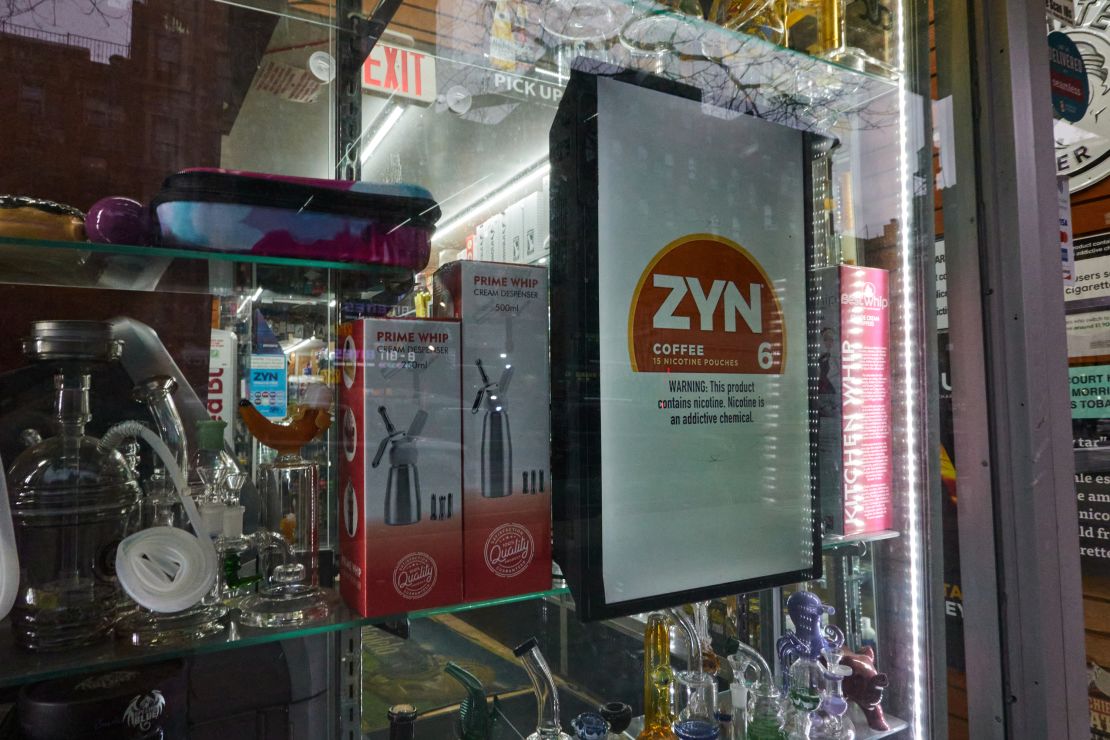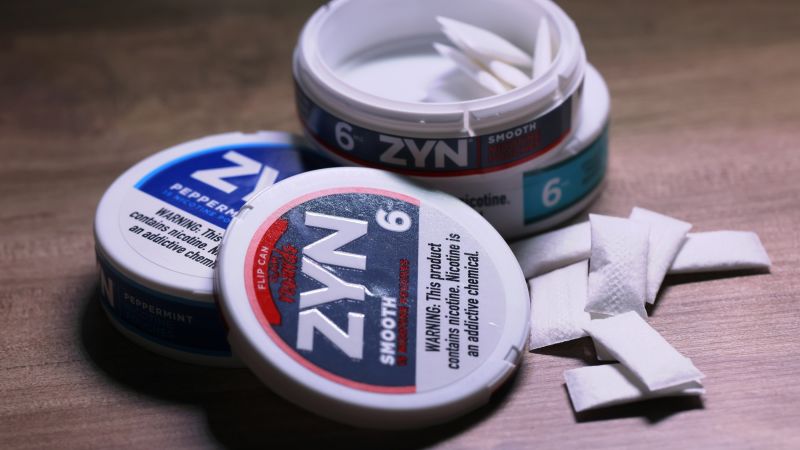Governments around the world have tried to kill the tobacco industry. Zyn, the brand of flavored oral nicotine pouches that comes in small, round containers resembling breath mints, is its latest strategy.
While it’s ultimately owned by tobacco giant Philip Morris International, Zyn is a tobacco-free product. White pouches similar in size to a piece of chewing gum send more nicotine than what’s in a cigarette right into the bloodstream. Unlike traditional chewing tobacco, you don’t have to chew the pouches or spit the build-up of tobacco juice.
Several trends have driven a surge in Zyn’s relatively wild popularity, from what users feel is its convenience and subtlety, to a flood of online advertising positioning Zyn as a healthier, smoke-free alternative to cigarettes. The brand’s success shows how tobacco companies have diversified their business models from cigarettes to tobacco-free products like vapes, snus, nicotine gums and inhalers. Researchers have called this the “pharmaceuticalization” of the tobacco industry.
Zyn’s advertising looks similar to those of many other lifestyle and health products. Advertisements with simple blue and white colors emphasize Zyn’s convenience, variety of flavors and use in many different situations. “Simple. Discreet. Satisfying,” one online ad says showing the cans next to someone typing on a laptop. “You’re free to enjoy it wherever your curiosity leads you.”
Zyn was test marketed in 2014 and went national in 2019. Since then it has become the leading nicotine pouch on the market. And the growth has exploded.
In 2023, Zyn pouch shipments in the United States hit 385 million cans, a 62% increase from the year prior, according to Phillip Morris International, Zyn’s parent company. Zyn shipments this year are expected to grow another 35%.
After a surge in demand for Zyn that led to shortages of the pouches — fans called it the “Zynpocalypse” —Phillip Morris International announced a $600 million investment last week in a new manufacturing facility in Aurora, Colorado, to increase production.
Zyn users like Danny Whalen, 26, switched to nicotine pouches last year after 10 years of chewing tobacco.
Whalen said that Zyn is cleaner than chewing tobacco, doesn’t hurt his gums as much, and he can pop in a Zyn in more places than he could spitting tobacco, like at work. He also believed it would be better for his health to stop chewing tobacco. Many health experts say nicotine pouches are a safer option than smoking or using chewing tobacco because they don’t contain cancer-causing chemicals, but nicotine pouch use does carry risks, and the long-term health effects are unknown.
“I like it better than chewing tobacco,” Whalen said. “The thought of chewing grosses me out.”
He now wants to quit Zyn, however, because nicotine is causing him anxiety. But it’s highly addictive and he’s having trouble stopping.
In 2023, Zyn spent $28 million on digital advertising, a 1,300% increase from the year prior, a study led by researchers at the Rutgers Institute for Nicotine and Tobacco Studies found, citing data from ad tracker Vivvix.
Influencers, known as “Zynfluencers,” promoting the pouches and marketing strategies like loyalty rewards programs have also boosted Zyn. Zyn has become subculture, particularly with young men on TikTok, the Rutgers researchers found. In one TikTok video that racked up more than 9 million views, the Nelk Boys — social media personalities — gift right-wing political commentator Tucker Carlson a 10-foot-tall can of Zyn. Joe Rogan and Logan Paul, who host the most popular and 47th most popular podcasts on Spotify, respectively, have also promoted Zyn.
In a statement to CNN, Philip Morris International, which bought Zyn manufacturer Swedish Match in 2022, said that the company doesn’t use social media influencers and rejects all requests for partnerships.
“ZYN advertises online with strict parameters that content be targeted to an audience of legal-age current nicotine consumers,” the company said. Its Instagram and Facebook channels and website are also age-restricted.
Zyn’s rapid rise reflects its aggressive marketing push, the Rutgers researchers found in their study.
Zyn has advertised on mobile apps like ESPN and sponsored events like the Beale Street Music Festival, the National Championships for Pickleball and IndyCar’s Music City Grand Prix. During the solar eclipse in April, Zyn compared its 60-minute pouches to the 4:28 minute eclipse duration. (Philip Morris International told CNN it only advertises at events with an adult audience of over 85%.)
“Zyn has capitalized on having a clean appearance… and this idea that it’s not tobacco, it’s just nicotine, which leads many people to feel it’s different and safer,” said Pamela Ling, the director of the Center for Tobacco Control Research and Education at the University of California San Francisco. “But nicotine addiction is not an innocuous and benign thing. It’s extremely distressful and really difficult for people to quit.”

Many public health experts say tobacco companies’ harm-reduction initiatives are a way to sustain the profitability of tobacco and nicotine products. Although nicotine pouch products have lower levels of toxicants than cigarettes or smokeless tobacco products, doctors, tobacco researchers and political leaders warn that Zyn’s marketing — which shows the brand in smoke-free environments like at work and in transportation — may perpetuate nicotine addiction among existing users or introduce nicotine to younger people.
A dependency on nicotine causes cravings and withdrawal symptoms such as irritability, headaches, dizziness and fatigue. Researchers have found long-term usage may be connected with heart disease, vascular disease, reproductive disturbances and more, according to the National Cancer Institute. Nicotine does not cause cancer or lung disease, according to the FDA.
Philip Morris International, which split from Phillip Morris USA, does not sell cigarettes in the United States. It said Zyn is not intended or sold as a smoking cessation product.
A better strategy from a public health approach, Ling said, would be to tailor nicotine pouch availability to prescriptions, smoking cessation clinics, quit lines and other programs to help consumers with tobacco and nicotine addiction.
“The mass marketing, especially on digital and social media, is the wrong way to promote health,” Ling said. “It’s driving popularity and driving a large pool of nicotine addicts.”
Read the full article here
